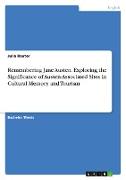Remembering Jane Austen. Exploring the Significance of Austen-Associated Sites in Cultural Memory and Tourism
BücherAngebote / Angebote:
Bachelor Thesis from the year 2009 in the subject English Language and Literature Studies - Culture and Applied Geography, grade: 1, 3, University of Passau (Faculty of Philosophy), course: International Cultural and Business Studies, language: English, abstract: This paper focuses on the physical sites which are associated with Jane Austen: the places where she lived and a selection of locations which appear in film adaptations of her novels. Both types attract thousands of visitors from all over the world each year. This leads to some of the following questions: Why do people feel the need to follow in her footsteps? Do they require these physical places in order to remember her? And considering the fact that the locations in question are now part of the tourism industry, how much do they actually still have to do with Jane Austen?
In cultural studies, memory is one of the most frequently discussed issues. In the last twenty years alone, there have been numerous publications on the subject. Inspired by the seminal work of Maurice Halbwachs (1877-1945), who was one of the first scholars to regard memory as a social phenomenon, Jan Assmann developed his theory of the ¿cultural memory¿ in 1988. Pierre Noräs concept of the lieux de mémoire, begun in 1984, continues to draw a great deal of attention in academic circles as well.
It is the aim of this paper to shed some light on the role the Jane Austen locations play in remembering her. In order to gain an understanding of this issue, certain aspects of Halbwachs¿, Noräs and Assmann¿s theories will be connected to Jane Austen tourism. A short summary of their ideas can be found in chapter 2. The criteria by which the locations will be evaluated are listed in chapter 3. Chapter 4 contains an analysis of some of the most prominent Jane Austen-themed locations in contemporary England, including their relevance to Jane Austen¿s life. The first part concentrates on places where she actually lived and where she stayed for longer periods of time. These are arranged in chronological order and followed by an analysis of several memorable film locations. In chapter 5, theory and practice will be joined in order to find answers to the questions previously asked. Finally, the paper ends with an overview of the relevant points.
Folgt in ca. 10 Arbeitstagen


